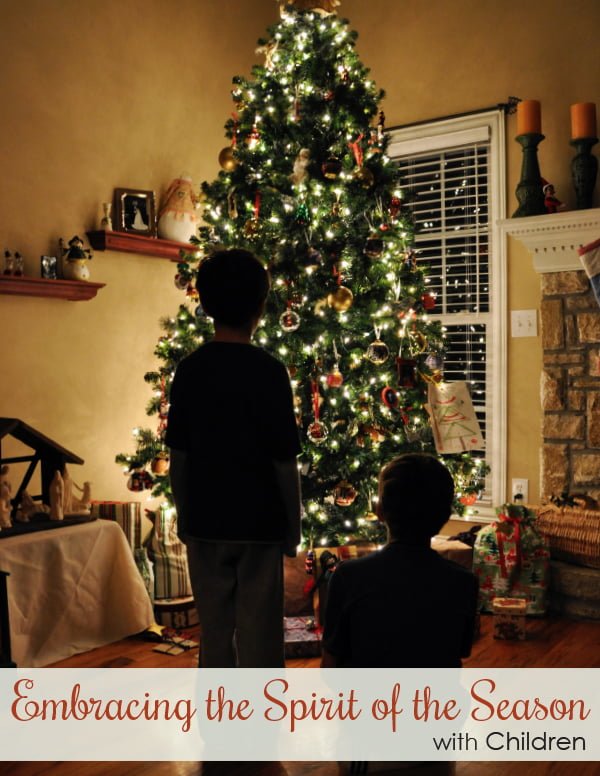Encouraging Spiritual Discovery This Season with Children
 “Love is what’s in the room with you if you stop opening presents and listen.” ~ Bobby, age 7. If you have a deep faith and keep the rituals of your religious tradition, then you’ve probably given a lot of thought to your child’s spiritual discovery and development and have your holiday religious plans all mapped out.
“Love is what’s in the room with you if you stop opening presents and listen.” ~ Bobby, age 7. If you have a deep faith and keep the rituals of your religious tradition, then you’ve probably given a lot of thought to your child’s spiritual discovery and development and have your holiday religious plans all mapped out.
If, on the other hand, you wonder how to put what you believe into words and aren’t sure what spiritual beliefs you want to pass on to your kids, this post is for you.
All humans have a spiritual dimension. You don’t have to believe in a supreme being to teach your child the great universal spiritual lessons and to help them along their spiritual discovery journey.
Whatever your beliefs, you probably want your children to know that life is sacred, that nature deserves a certain reverence, that your child’s presence in the world can contribute to joy and goodness, that things have a way of working out (not always as we expect), that the greatest joy usually comes from connecting and sharing with others, and that while we don’t always get what we want, we can always choose to make the most of what we get.
Some ideas for spiritual discovery, at the holidays and any time…
Nurture your child’s natural sense of wonder | People who feel connected to nature are healthier physically and emotionally. Don’t feel you have to turn it into a science lesson, reducing the sacred whole to mechanistic parts. Just try to build in enough time so you can stop rushing your child past the wondrous moments of everyday life: sun glittering on the snow, the rising moon, candles in the dark, the fragrance of green things… all remind us that we’re surrounded by miracles.
Let children hear the sounds of silence | Many of us use background TV and radio as a way to avoid being alone with ourselves. Children, even more than the rest of us, need quiet time to simply be present with themselves. Music is a wonderful part of setting the mood in your house, and singing is essential to celebration. But if radio or TV voices are intruding on the peacefulness of your home, it increases everyone’s tension level. Why not take the opportunity over the holidays to turn off the TV and radio, and lift the mood with inspiring music–or simply hear the power in silence?
Take time as a family for reflection | If your tradition includes prayer, what better time than these special days in December, when so many religions celebrate the miracle of faith? But whether you pray or not, how about a family conversation about the deeper meaning of the holiday you celebrate? Maybe you’ll decide to open your holiday dinner with a special candle lighting ritual or gratitude ceremony to remind you why you’re all together that you’re on this spiritual discovery journey together?
Model gratitude | Gratitude is a time-honored spiritual path that makes us happier and more generous regardless of our beliefs about the nature of the divine. The deeper our gratitude, the greater our ability to receive, and the more we get out of life. Of course, children don’t have the context to understand their many blessings, and guilt isn’t an effective teacher. Modeling is the best strategy; simply noting aloud, frequently, how lucky we are to have this sunny day, this bountiful meal, this reliable car, such a terrific teacher or neighbor, and, of course, each other. Family habits like grace before meals, counting our blessings, or a thank you at bedtime for the delights of the day plant seeds for your child to develop a deeper gratitude as she matures.
Help your child find his inner angel | Children (like the rest of us) find it puzzling that the world is so often unjust. It’s empowering for them to know that there are always helpers in the world, and that they can choose to be one. Whatever your religious beliefs, you probably want your kids to know that the angels and elves — literally or figuratively — depend on our help. Generosity starts with a feeling of having plenty — emotionally, more than materially — and develops as we have experiences of making others happy by giving to them.
Research shows that the experience of giving actually activates an area of the brain that gives us physical pleasure. If we want to teach our kids the true meaning of the holidays and help them along their spiritual discovery, we need to help them have the experience of giving to others, so they can discover their own joy in it.
Love is always in the room with you, no matter what day it is, or what your faith may be. What better time to help your child listen?
